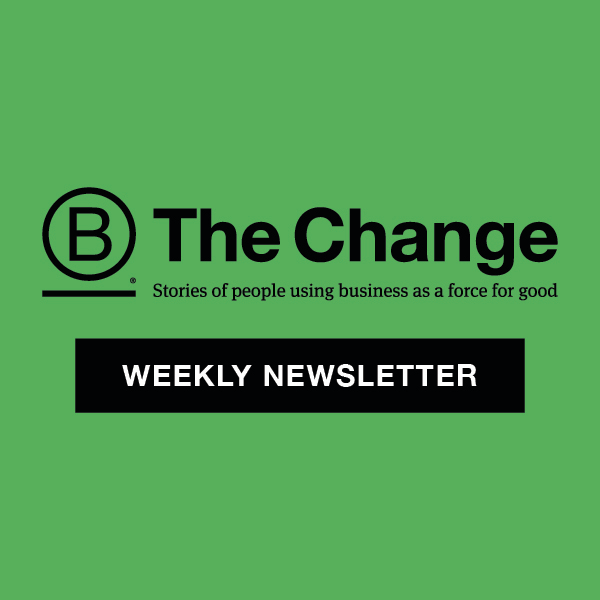How B Corps Are Structuring Anti-Racism into Their Business Models: Partnerships, Products, and Policies to Advance Racial Equity
March 9, 2022
The work to advance racial equity at Certified B Corporations in the U.S. and Canada means dismantling racist systems and policies while reshaping businesses and workplaces to function for the good of all people. By adapting their policies and products to address systemic racism and advance equity, B Corps can help build a more inclusive economy.
This article highlights examples from B Corps exploring new ways to use business as a force for good while unlearning, discovering, and collaborating to pursue racial equity. They’re doing this by creating and reimagining partnerships, products, and policies to reduce inequality and increase inclusion in our global economy.

Subscribe to B The Change Weekly
Learn more about this growing movement of people using business as a force for good, and sign up to receive the B The Change Weekly newsletter for more stories like this one, delivered straight to your inbox once a week.
Partnerships That Spark New Internships and Investment Products
B Corp Common Interests helps its clients put their money to work in alignment with their values through impact investing and holistic financial planning. Max Mintz, partner and financial advisor, says the firm was founded with the principles of justice, equity, diversity, and inclusion and solidified that when it became a B Corp in 2014. In the wake of George Floyd’s murder and the social upheaval in 2020, he said, Common Interests started its journey to becoming a truly anti-racist firm.
“We formed a working group and met with members of our network and started doing the work,” Mintz said. “It’s uncomfortable work, as we uncover unconscious biases and realize the impact of our firm and our investments and our policies on all of these issues. It led us to an interesting place.”
That also coincided with the firm’s growth amid growing demand for its services, which Mintz said led to a focus on building anti-racist hiring practices. “We hope to create a path to diversify the industry, so we looked at a couple different issues — ways we could create meaningful impact on the financial services industry and through our investment portfolios,” he said.
Because most people working in the financial services industry are white males, Mintz said, Common Interests started talking with clients and partners and seeking their input on how they could help create change while addressing unconscious biases and other invisible forces. Drawing on his Philosophy degree and his studies of egalitarianism, Mintz focused their work on the idea of creating equal access to advantages.
What that looks like in reality is partnering with a network of other financial firms to create an internship and mentorship program that recruits from historically Black colleges and universities (HBCUs). The Wall Street Diversity Accelerator Program provides five-week paid internships that includes speaker sessions on networking and other soft skills.
The other focus for Common Interests has been identifying unconscious biases in its investment process. Mintz said that has prompted the firm to re-examine its everyday processes, including the use of ESG — environmental, social, and governance — data in investing decisions. ESG factors have become popular among investors and business leaders looking to shift toward more sustainable products. But there are no official parameters for measurements in these areas, creating questions about the validity and value of ESG claims.
“ESG data is, in my view, being used to do business as usual while paying lip service to these ideals,” Mintz said. “We eventually realized that ESG vendors are building risk management tools that look not at the impact of companies on the planet but on the impact of the planet on a company’s bottom line.”
While that data is valuable for asset managers to consider and incorporate, Mintz said Common Interests is going a step beyond by partnering with YourStake.org to develop a “Your Values” online questionnaire for clients that helps identify investment priorities for social and environmental benefit. To help avoid biases, the tool behind the questionnaire incorporates data pulled from public sources such as nonprofits and non-governmental organizations.
To shape their investment profile, clients provide answers ranging from “strongly agree” to “strongly disagree” on statements including:
- Companies should pay workers a living wage, even if that means employing fewer people.
- Prisons effectively deter crime.
- Society should extend extra opportunities to historically oppressed minorities.
“Our role is to work with stakeholders to learn what matters to them and to present data sets to clients so they can decide what issues matter to them and be the bridge,” he said. “Since we moved to this platform, no one has ever argued with the data, and the conversations we have with our clients are more personal and deeper.”

Anti-Racism Business Resource: Commit and Act
This guide from B Lab features commitments, actions, and ideas for business leaders ready to shift toward anti-racist business practices.
Products That Better Reflect the Diversity of Our Communities
Other B Corps are turning to their purpose and tapping into their strengths to launch, expand, or adjust their products and worker programs to involve and uplift People of Color. Since establishing its Diversity, Inclusion, and Belonging committee in 2018, Uncommon Goods has taken a thoughtful, genuine approach to engage workers in racial equity work. Beth Rivera, Uncommon Goods’ Head of People, leads the committee and its 25 other members representing a cross-section of the business.
“We have a lot of work to do,” Rivera says. “It’s a journey — not an event — that we’re making with support and guidance from our team members.”
One change made after the summer of 2020 was the company’s commitment to becoming a source for products created by independent makers who are People of Color. This growing collection connects customers with new products and provides a new market for makers.
Uncommon Goods also continues its racial equity and inclusion work including previous advocacy for a higher minimum wage and paid family leave. These policies can help everyone, but especially people who have historically faced systemic racism. As part of its ongoing equity work, Uncommon Goods focuses on recruiting team members from underrepresented groups and networking with a broader range of community organizations.
Learn more: From Words to Action: B Corps Add Products and Programs with Black Creators to Build a More Inclusive Economy
Policies That Expand Employment Opportunities
Research shows the benefits of a more diverse workforce — financial, societal, professional, and otherwise. But it was the firsthand experience as a marketer and educator as well as a desire to better resemble and serve the community that inspired Nico Brooks and his colleagues at Two Octobers to establish a new hiring program. In 2021, Denver-based B Corp Two Octobers launched a digital marketing apprenticeship to provide an on-ramp to careers in the field for applicants who are People of Color or do not have a college degree.
By creating a program that has no college degree requirement and seeking applicants through new avenues, Two Octobers opens the door to people that the B Corp otherwise likely wouldn’t reach. It also reflects the digital marketing agency’s work primarily with purpose-driven organizations, including nonprofits and fellow B Corps, and emphasis on teaching, coaching, and training.
“The spirit of this was to keep people employed and to invest in the community,” Brooks says.
The program has gone so well that Two Octobers now plans to start all new entry-level employees as apprentices, Brooks said. The B Corp also set aside budget and resources to train digital marketing apprentices for other B Corps.
“Our goal is to get to the point that there is a cohort of apprentices who can support each other and in other organizations. I feel like we’re just getting started,” he said. “We can try our best to provide support and training and resources, but whatever you’re talking about, having people going through the same thing that you are is really valuable.”
Learn more: How B Corps Are Reshaping Hiring and Employment Practices to Diversify Their Workforce and Strengthen Their Business
Other B Corps are broadening employment opportunities through new policies or practices. The Body Shop North America recently expanded its Open Hiring practices, which eliminate common barriers to employment, such as background checks, drug screenings, and previous experience. Following two successful pilot programs for seasonal employees, Open Hiring will serve as a permanent recruitment model for all customer consultant and entry-level positions in the B Corp’s stores and distribution centers.
Greyston Bakery, another B Corp, created the Open Hiring program in 1982. It has since developed an Inclusive Hiring program as a resource for other companies that provides mentoring, an e-learning portal, data collection, and recruitment services.
Sign Up for our B The Change Newsletter
Read stories on the B Corp Movement and people using business as a force for good. The B The Change Newsletter is sent weekly.